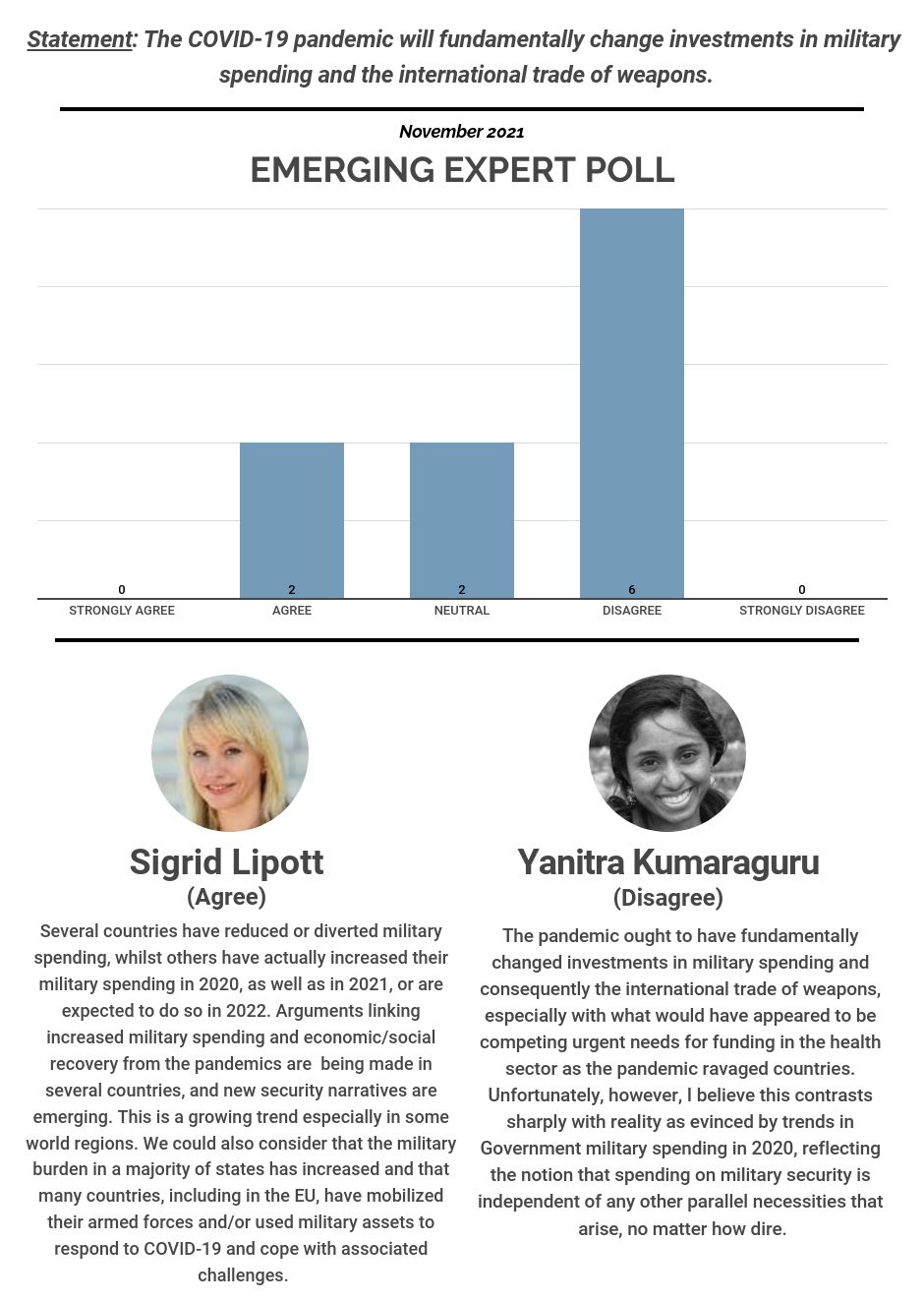Is the COVID pandemic changing the arms trade?
The Forum asks Emerging Experts*
November 15, 2021
November 15, 2021
STATEMENT: The COVID-19 pandemic will fundamentally change investments in military spending and the international trade of weapons.
See all responses below:
Agree
|
Sigrid Lipott (PhD, International University Institute of European Studies; Small Arms Survey): Several countries have reduced or diverted military spending, whilst others have actually increased their military spending in 2020, as well as in 2021, or are expected to do so in 2022. Arguments linking increased military spending and economic/social recovery from the pandemics are being made in several countries, and new security narratives are emerging. This is a growing trend especially in some world regions. We could also consider that the military burden in a majority of states has increased and that many countries, including in the EU, have mobilized their armed forces and/or used military assets to respond to COVID-19 and cope with associated challenges. It is difficult to give a clear-cut answer, the evolution is not clear and will depend on the crisis related developments, but all in all I agree with the above statement.
|
|
Michael Picard (Independent researcher): The pandemic caused Switzerland's largest mobilization of the armed forces since WWII. While the Swiss Military doesn't exactly determine global arms transfers, it demonstrates how countries relied on their militaries to meet the challenges of the pandemic. For such countries, the experience could lead to a shift of defense priorities in which more budgetary emphasis is placed on addressing emergent security challenges, such as pandemics, climate disasters, and migration. This could have an impact on international military spending and arms transfers.
|
Neutral
|
Jordan Cohen (Policy Analyst at the Cato Institute and a Political Science Ph.D. candidate at George Mason University): The U.S. is selling weapons to more risky countries than ever before, largely due to the fact that the pandemic allowed authoritarians to become stronger. On the other hand, some countries became weaker, and now the U.S. is selling more weapons to sustain them. Any changes in weapons sales or military spending will be because of other factors, such as the war in Yemen, pressure on Congress to restrain the President and/or reduce military spending, etc.
|
|
Francesco Buscemi (Ph.D. candidate at Sant'Anna School of Advanced Studies; Research School on Peace and Conflict at PRIO, Oslo): One may argue that diversion of funds from the defence to the health sector will drastically change military spending and the international weapons trade. At the same time though, in certain countries (this was the case in Italy for example), militaries have acted as civil protection enhancer and have provided logistic support in the application of health-related measures to fight COVID-19, a reason for which some have advocated for the need to at least keep military spending stable.
|
Disagree
|
Yanitra Kumaraguru (Faculty, University of Colombo; Coordinator, Sri Lanka Campaign to Stop Killer Robots): The Covid-19 pandemic ought to have fundamentally changed investments in military spending and consequently the international trade of weapons, especially with what would have appeared to be competing urgent needs for funding in the health sector as the pandemic ravaged countries. Unfortunately, however, I believe this contrasts sharply with reality as evinced by trends in Government military spending in 2020, reflecting the notion that spending on military security is independent of any other parallel necessities that arise, no matter how dire. Stunningly, in Sri Lanka for example, an Appropriation Bill for 2022 when presented to Parliament included an increase in military spending and a simultaneous decrease in healthcare expenditure. Also worth monitoring as incidental, in relation to the pandemic and its impact on military spending, is the extent to which the pandemic may have contributed to militarisation.
|
|
Xiaodon Liang (PhD candidate at The Fletcher School of Law and Diplomacy): There may be some countries in which increases to health system funding will squeeze out military budgets, but it is deterioration in the U.S.-China relationship that will continue to be the primary driver of total worldwide spending trends. The COVID pandemic has only hastened the two countries' decoupling, both limiting physical travel and straining political ties. The fact of the coronavirus' origins in China flowed neatly into pre-existing narratives of mistrust in the United States and beyond and yet, paradoxically, China exits the pandemic strengthened -- vindicated by the relative success of its zero-toleration policy and riding a boom in exports toward economic recovery.
|
|
Osebhahiemen Okooboh (International Conflict Management Ph.D. student with a concentration in National Security): While I agree that the pandemic will, to some extent, change investments in military spending and the international trade of weapons, I do not believe that the change will be fundamental. The increase in the US's NDAA from FY 21 ($732B) levels to FY22 levels of $768B says as much. Worsening US-China relations and the looming threat of an escalating China-Taiwan conflict belies the fundamentality of the change.
|
|
Diana Wueger (PhD candidate at the University of Chicago; Faculty Associate for Research at the U.S. Naval Postgraduate School): There are likely to be some cuts to defense procurement budgets in the short term as states seek to meet the social and economic costs of the pandemic, but the experience of the pandemic does not seem to have had a significant effect on the structural factors, real and perceived threats, and domestic politics that drive weapons acquisitions and sales for most states. This is particularly true for capital acquisitions, which were budgeted and programmed well before the pandemic started.
|
|
Gabriel Mondragón Toledo (Ph.D. student at the University of Hamburg): The pandemic has showed that current trends in military spending have pushed other pressing issues aside. Despite this fact, we can observe an increase in military spending from different countries. This has somehow responded to social unrest and fears of confrontations with other countries. Once more, coercive means prevail over attention to root causes. I think the pandemic had the potential of providing new ways of thinking about military spending, but it will ultimately be a missed opportunity.
|
|
Hanna Homestead (researcher and advocate for progressive peace and security policies): I don't think the pandemic will fundamentally change the arms trade, though it should have. Covid-19 brought to light the social, economic, and environmental disparities and challenges that are the true threat to US national security and are too often ignored by politicians and political elites. However, instead of addressing these issues, our government continues to invest in conventional weapons systems that will do nothing but hasten us towards future conflict.
|
* Institutional affiliation, where indicated, is for identification purposes only. Inclusion in this list does not indicate agreement with or endorsement of the opinions of others. To learn more about the Emerging Experts list and program, click here.
This program is funded by the Rosa-Luxemburg-Stiftung New York Office with support from the German Ministry for Economic Cooperation and Development (BMZ). The Forum's work is further supported by the Carnegie Corporation of New York and the Rockefeller Brothers Fund.
This program is funded by the Rosa-Luxemburg-Stiftung New York Office with support from the German Ministry for Economic Cooperation and Development (BMZ). The Forum's work is further supported by the Carnegie Corporation of New York and the Rockefeller Brothers Fund.











